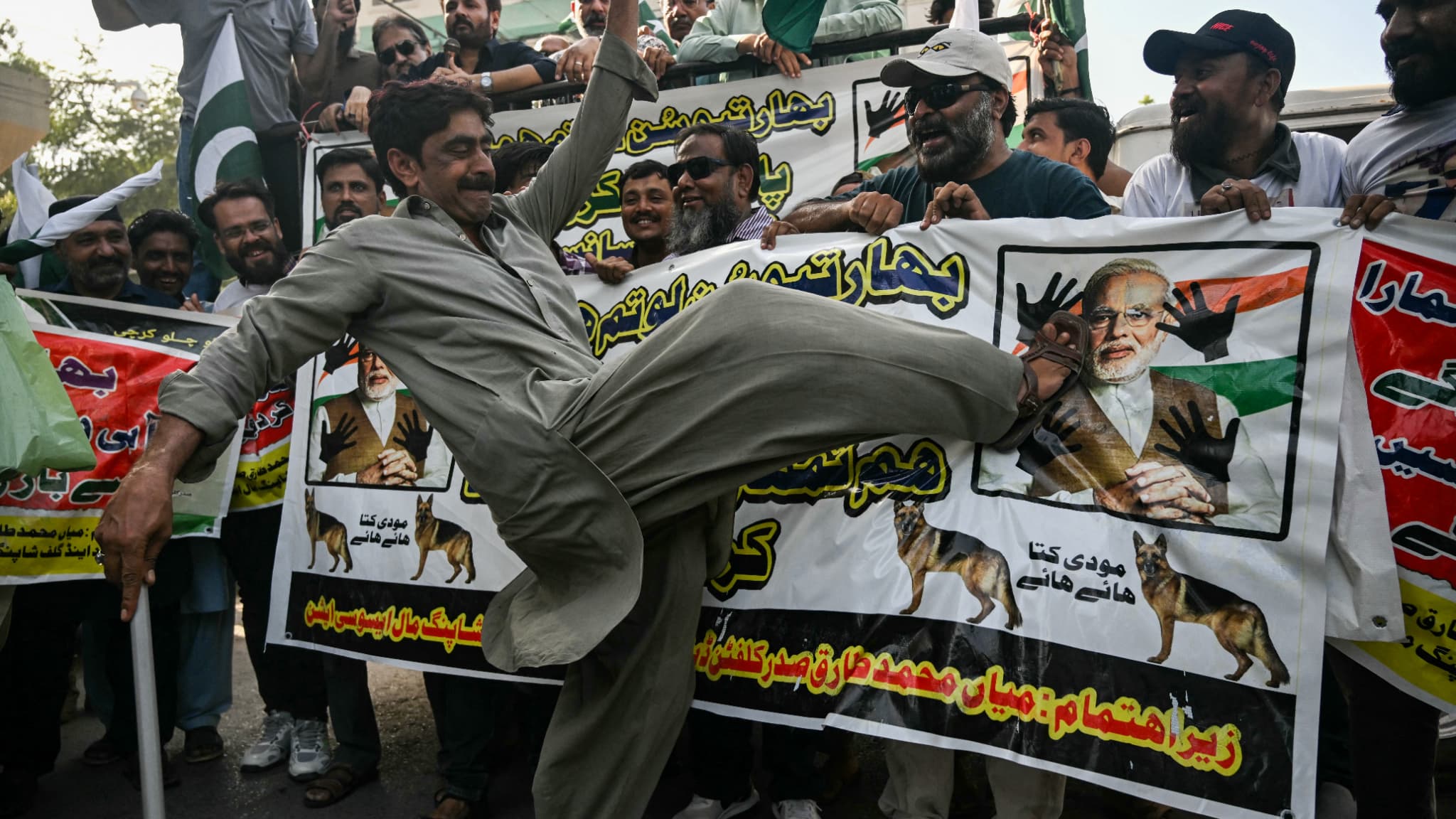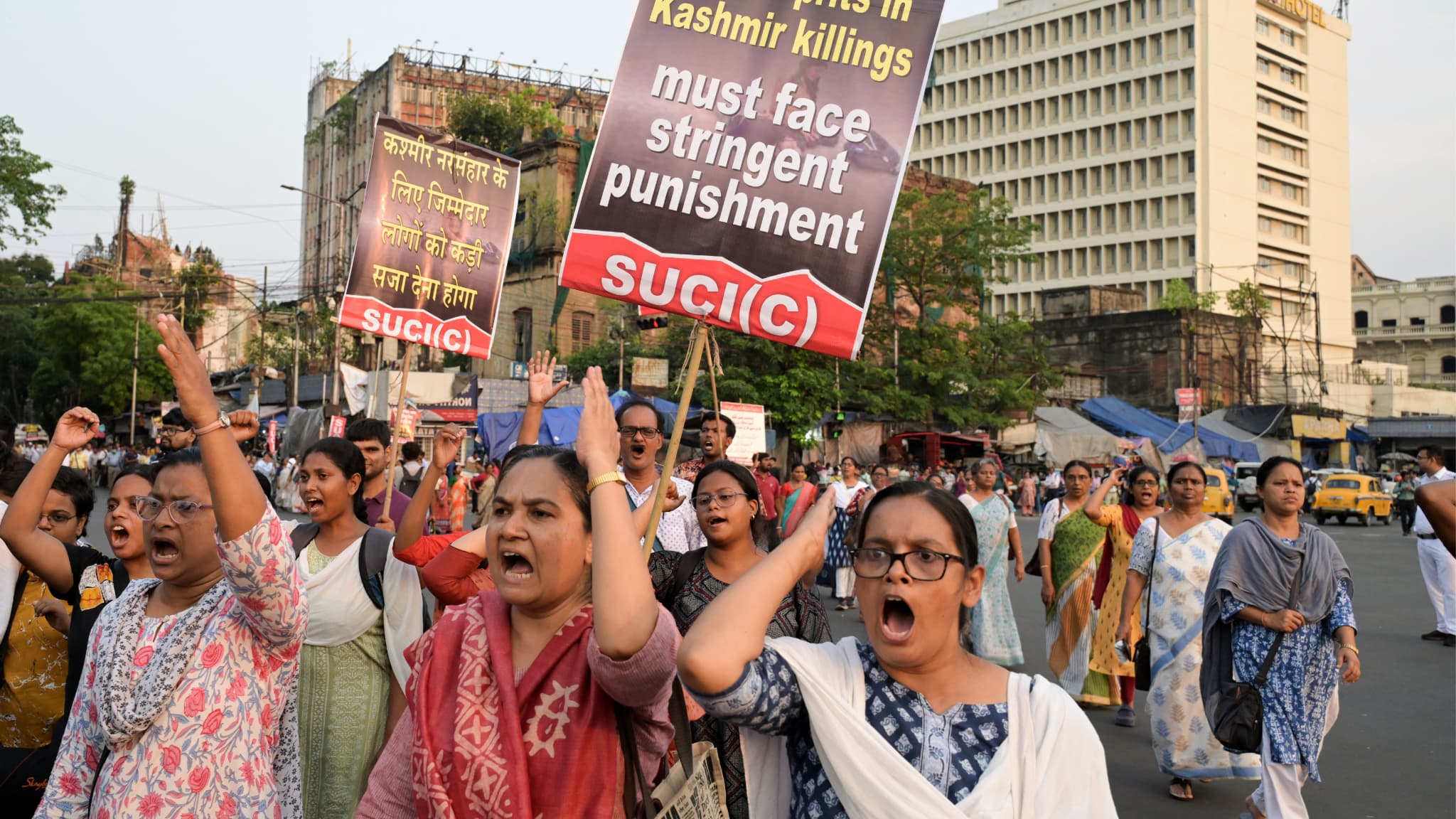Enemy brothers. The nickname given to India and Pakistan is more true than ever when the tensions are exacerbated between the two neighboring countries, taking them back to the worst hours of their rivalry since their independence in 1947. The trigger? An attack that caused the death of 26 people on April 22 in the Indian Kashmir. Fear? The commitment of a military escalation between two nuclear powers.
• Why a rebirth of tensions?
On April 22 in the afternoon, at least three armed men emerged in the tourist city of Pahalgam, in the Indian Kashmir in the Himalayas foothills. According to witnesses interviewed by the France press agency, the attackers separated men from women and children and executed those who could not recite the call to prayer of Muslims.
The results are heavy: 26 dead, 25 Indian citizens and a tourist from neighboring Nepal. This attack is the deadliest aimed at civilians for more than twenty years in the region.
Very quickly, the Indian police identified three suspects of the attack, an Indian citizen and two Pakistani nationals. They are presented as members of the Resistance Front (TRF), of the jihadist group of Lashkar-E-Taiba (LET) based in Pakistan. India suspects that this movement has carried out attacks that killed 166 people in Bombay in 2008. No identified movement claimed the responsibility of this attack.
As part of the investigation, the National Investigation Agency (NIA), the Indian Federal Judicial Police, has carried out more than 2,000 arrests and interrogations. Prime Minister Narendra amended promised to locate the authors of the attack and their accomplices “until the end of the earth.”
• Why does New Delhi accuse Islamabad?
The suspicions around the participation of the Pakistan -based resistance front seem to be enough in the eyes of New Delhi to point to Islamabad, who immediately denied and claimed a “neutral investigation.”
“Pakistan denies because India does not bring concrete evidence, but that has been doubts, because it would not be the first time” that Islamabad would be involved, underlines with BFMTV.com Gilles Boquérat, associated researcher at the Strategic Research Foundation (FRS) and specialist in South Asia.
“Disabling India is an old Pakistani project,” he adds.
Since their independence granted by the British in 1947, the two neighboring countries have maintained conflicting relations marked by several wars and periods of strong tensions. In August 1947, the former colony was divided into two states: India, most Hindu and Pakistan, with a Muslim majority.
The tensions crystallize around the control of the Kashmir, a territory itself divided into two in 1949. Part returns to Pakistan, the Azad-Kashmir and the other to India, the state of Jammu-Et-Cachemire. For more than 70 years, New Delhi and Islamabad have claimed the sovereignty of the entire territory.
And, above all, since 1989, the Indian part of most of the Muslims has been the scene of a violent separatist insurrection. India regularly accuses Pakistan, who denies, of funds and leading the insurgents, who lead the fighting against about 500,000 Indian soldiers deployed in the region. To date, they have made tens of thousands of deaths, soldiers, rebels or civilians.
Nueva Delhi opposes any independence from the region and even repealed its constitutional independence in 2019. Since the arrival of Narendra Modi at the head of the Government, the State has carried out a hostile policy to Muslims. Amnesty International has repeatedly denounced arbitrary arrests in the Indian Kashmir.
• Towards a military response from India?
After the attack of April 22, New Delhi quickly announced a series of sanctions against his rival. Among them, the closure of the main post of the Earth’s border between the two countries, the withdrawal of numerous diplomats, the suspension of the issuance of visas to the Pakistani … Almost in reality, Pakistan announced in retaliation for the closure of their simple space to the Indian companies, said personnel not pleasant of many Indian diplomats and, in turn, canceled the visas to the visas to the Indian citizens.
Then, two days later, the two countries began to exchange shots. Now, for the sixth consecutive night, their soldiers collided with light weapons fire, along the “control line”, the border that divides the back. If these skirmishes were not victims or important damage, experts anticipate a military response from New Delhi.
Pakistan said that “having credible information according to which India intends to launch a military strike in the next 24 to 36 hours, using the Pahalgam incident as a pretext.”
“Any assault will lead to a decisive response. India will be totally responsible for any serious consequence in the region,” warned Pakistani information minister Attaullah Tarar. Prime Minister Narendra Modi gave the army on Tuesday to organize the “Indian response to attack” according to those around him.
“The Modi government wants to show the muscles and has gone in a war rhetoric, it is important for its internal policy,” analyzes researcher Gilles Boquérat.

Already in 2019, after a deadly attack on his soldiers, India had led an air attack in the field of Pakistan, which he later took reprisals. “Unlike 2019, where there was a surprise effect, India must spend this time in this alert state without this leading to an underwater escalation,” says the specialist.
• Nuclear weapon: Dysmasion or real threat?
The two countries have the atomic weapon that increases the fears of a nuclear conflict, and in these periods of tensions, make it a point of honor to remind you. “The fact that there is the risk of climbing between two nuclear powers is among the most serious global security problems that can arise,” says Colin Clarke, scientific director of the Soufan Center, in New York cited by our colleagues.
But behind the atomic weapon, what prevails is the deterrence it generates.
“In times of crisis, each party must show its determination against their public opinion, but that does not necessarily indicate a real intention to use the atomic weapon,” Jean-Luc Racine, a specialist in relations between India and Pakistan, judges.
In 1999, the two rivals had shown the nuclear threat and then “far from the edge of the abyss” facing “the consequences of a nuclear war,” illustrates Amin Saikal, Professor Emeritus of Studies in the Middle East and Central Asia at the National University of Australia in the columns of the conversation. “Nuclear deterrence could be effective again to prevent both parties from worsening the current conflict,” he said.
• Why is an “aquatic war” feared?
As part of its series of sanctions, India has suspended a 1960 bilateral treaty on the Water Exchange of the Industry River, a crossforder river that rises in the upstream of upstream and ends in Pakistan downstream. Islamabad warned on Thursday that any Indian attempt destined to interrupt or divert the flow of water between them would be considered as an “act of war” to which it would respond “with all its power.”
According to Jean-Joseph Boillot, associate researcher at the Institute of International and Strategic Relations (IRIS) and Economist, India wishes “to renegotiate this contract for two decades” taking into account that it promotes Pakistan and that “India, more populated, has more and more water.”
“This suspension aims to push Pakistan to renegotiate the water exchange,” said the specialist interviewed by BFM Business. For Pakistan, this treaty is essential for the support of its agriculture that represses a quarter of its GDP and its suspension could cause water shortage, while certain regions face drought.
“Threatens to play in the river flow is a long -term threat, we do not build prey during the night,” says Gilles Boquérat.
The researcher also recalls that this treaty was negotiated under the auspices of the World Bank and that, therefore, there is a “arbitration court” located in The Hague. “Its international scope should not be set aside,” says the researcher.
• What are international reactions?
Tensions that cross a new level between two nuclear powers every day concern the international community.
The UN Secretary General, Antonio Guterres, called a separate telephone interview with the two parties to “avoid” the confrontation and their “tragic consequences.” “Attacks against civilians are unacceptable in any circumstance,” he said.
The United States Secretariat announced that Marco Rubio was going to contact his Indian and Pakistani counterparts to urge them to “not worsen the situation.” When Chinese diplomacy asked the two countries “to show restriction”, “administer their diverse by dialogue and jointly maintain regional peace and stability.”
The Turkish president, Recep Tayyip Erdogan, asked that the “growing tensions” “be discouraged as soon as possible, before moving on to a more serious situation.”
If the European leaders such as British Prime Minister Keir Starmer or Emmanuel Macron had reacted after the attack, since then they have not expressed their point of view about the climb of tensions.
Source: BFM TV


